The Chinese structure indicated that here - i.e.
immediately after the birdlist - viz. from July 30 up to and
including August 25, there was a kind of outstretched net:
|
10 |
Girl |
ε Aquarii
(Al-bali) |
Bat |
Jan 29
(394) |
|
11 |
Emptiness |
β Aquarii
(Sad-al-sud) |
Rat |
Febr 9
(405) |
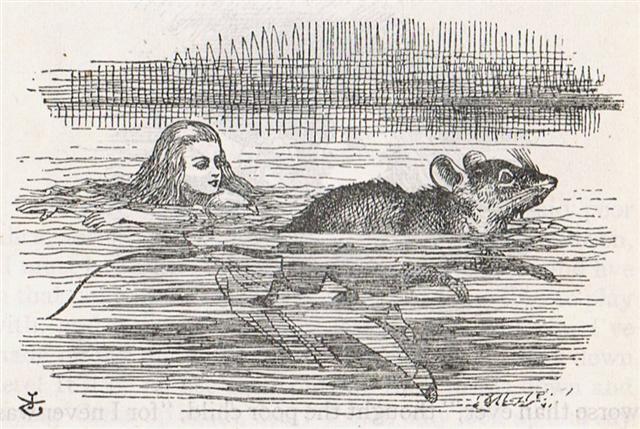
... In
China, with Capricornus, Pisces, and a part
of Sagittarius, it [Aquarius] constituted
the early Serpent, or Turtle, Tien Yuen;
and later was known as Hiuen Ying,
the Dark Warrior and Hero, or Darkly
Flourishing One, the Hiuen Wu, or
Hiuen Heaou, of the Han dynasty, which
Dupuis gave as Hiven Mao. It was a
symbol of the emperor Tchoun Hin, in
whose reign was a great deluge; but after
the Jesuits came in it became Paou Ping,
the Precious Vase. It contained three of the
sieu, and headed the list of zodiac signs as
the Rat, which in the far East was
the ideograph for 'water', and still so
remains in the almanacs of Central Asia,
Cochin China, and Japan ...
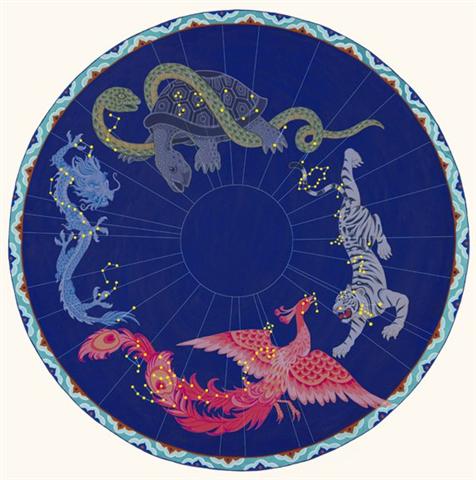 |
|
12 |
Rooftop |
α Aquarii
(Sad-al-melik) |
Swallow |
Febr 18 (414) → Bharani |
|
... Now birds and fishes
are born under the sign of the Yin
[Moon], but they belong to the Yang
[Sun]. This is why birds and fishes both lay
eggs. Fishes swim in the waters, birds fly
among the clouds. But in winter, the
swallows and starlings go down into the sea
and change into mussels ... |
|
13 |
House |
α Pegasi
(Markab) |
Pig |
March 5
(414 + 15 = 365 + 64) |
|
March
equinox (0h) |
|
14 |
Wall |
γ Pegasi
(Al-genib) |
Porcupine |
March 22
= 365 + 80 + 1 |
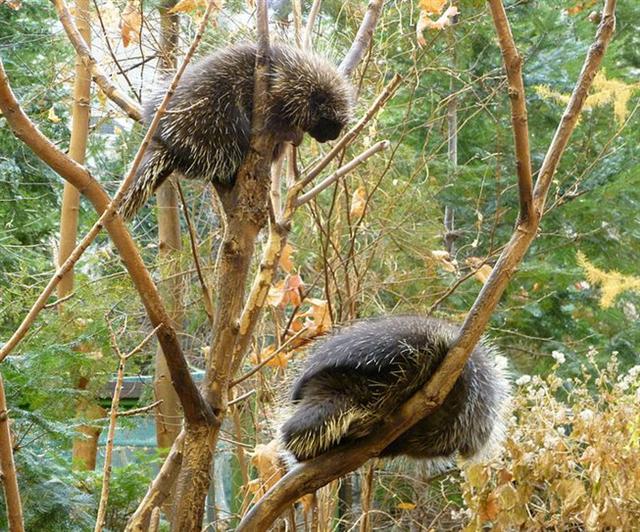 |
|
127 days |
|
24 |
Willow |
δ Hydrae
|
Stag |
July 28
(209) |
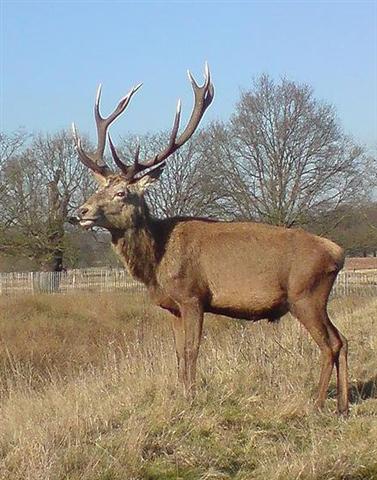 |
|
25 |
Star |
α Hydrae
(Al-phard) |
Horse |
Aug 10
(222) |
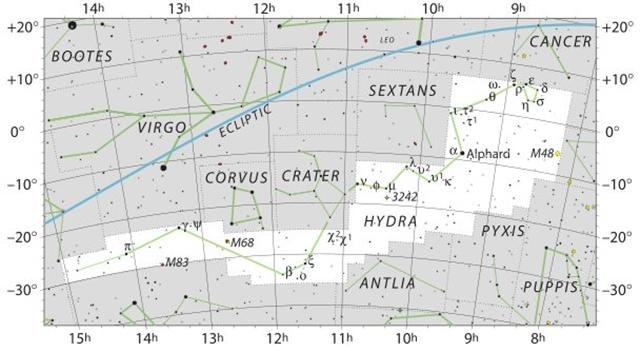 |
|
26 |
Extended
Net |
ε Hydrae
/ μ Hydrae |
Ox |
July 30
(211) / Aug 25
(237) |
|
EXTENDED NET
- Ox |
|
July 30 (211) |
25 |
Aug 25
(237) |
|
ε Hydrae |
μ Hydrae |
|
27 days |
|
|
27 |
Wings |
α
Crateris (Al-kes) |
Snake |
Sept 2
(245 = 181 + 64) |
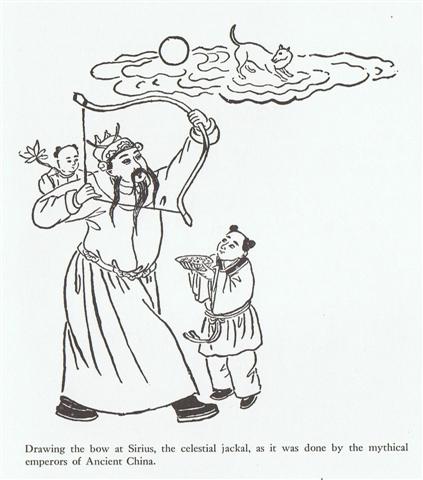
... Hotu's canoe
sailed from Maori to Te Pito O Te
Kainga. It sailed on the second day of
September (hora nui) ... (E:74) |
|
28 |
Chariot |
γ Corvi
(Gienah) |
Worm |
Sept 22
(265) |
|
365 - 100
= 265 = September
equinox = 84 + 181 |
|
he tu-ao |
he tuvi → he tavi |
|
|
|
The dark
brown tern with a round tail is called
tuao ... Ao, the
world.
I was told that tavi is a small,
lead-colored bird that lives on the little
islets (motu) off the coast. He is
supposed to look like the tuvi, the
grey tern, and owes his name to his call
...
Grey tern, Tuvituvi (Procelsterna
caerulea skottsbergi) ...
Anous stolidus
unicolor
...
The calling out (ragi)
of the tuvi bird (viz. tavi)
was strangely not heard before his
appearance, a sign of time reversed. It was
the same as the order between thunder and
lightning:
... It was 4 August 1968,
and it was the feast day of Saint Dominic,
patron of Santo Domingo Pueblo, southwest of
Santa Fe. At one end of the hot, dusty
plaza, a Dominican priest watched nervously
as several hundred dancers arranged in two
long rows pounded the earth with their
moccasined feet as a mighty, collective
prayer for rain, accompanied by the powerful
baritone singing of a chorus and the beat of
drums. As my family and I viewed this, the
largest and in some ways the most impressive
Native American public ceremony, a tiny
cloud over the Jémez Mountains to the
northwest got larger and larger, eventually
filling up the sky; at last the storm broke,
and the sky was crisscrossed by lightning
and the pueblo resounded with peals of
rolling thunder ... |
|
MAY 25
(5-25) |
26 (*266) |
27 |
28 (348) |
 |
 |
 |
 |
|
Ga3-6 |
Ga3-7 |
Ga3-8 |
Ga3-9 (68) |
|
Āshleshā-9 (Embrace) /
Willow-24
(Stag)
π¹ Ursa Majoris,
δ HYDRAE (129.6),
AL
MINHAR AL SHUJĀ
= σ Hydrae,
MUSEIDA
= π² Ursae Majoris
(129.9)
RAS ALHAGUE
(α Ophiuchi)
|
Al
Nathrah-6 (Gap)
BEEHIVE (Exhalation of Piled-up Corpses)
= ε Cancri,
η Pyxidis (130.4),
XESTUS
= ο Velorum
(130.5), ζ Pyxidis (130.7),
ASCELLUS BOREALIS = γ Cancri,
β Pyxidis (130.9)
*89.0 = *130.4 - *41.4 |
Extended
Net-26a (Ox) /
Arkū-sha-nangaru-sha-shūtu-12
(Southeast Star in the Crab)
η Hydrae (131.0),
ASCELLUS
AUSTRALIS
= δ Cancri
(131.4),
KOO SHE (Bow
and Arrow)
= δ Velorum
(131.6), α Pyxidis
(131.8),
ε
Hydrae
(131.9)
*90.0 = *131.4 - *41.4 |
ι Cancri (132.0), ρ Hydrae (132.4)
*91.0 = *132.4 - *41.4 |
|
... He is bound to it with
willow thongs
in the 'five-fold bond' which joins wrists,
neck, and ankles together
...

... They
were Ranginui, the Sky Father, and
Papatuanuku, the Earth Mother, both
sealed together in a
close embrace. Crushed between the
weight of their bodies were their many
children, whose oppression deepened. They
yearned to be free; they fought their
parents and each other to break loose.
Tuumatauenga, virile god of war, thrust
and shouted; Tangaroa of the oceans
whirled and surged; Tawhirirangimaatea,
Haumiatiketike and Rongomatane,
of wild foods and cultivated crops, tried
their best but were not successful; and
Ruamoko, god of earthquakes, yet to be
born, struggled in the confinement of his
mother's womb ... Of them all, Taane
Mahuta [cfr Mahute, Boussonetia
papyrifera], the god of the forests, was
the most determined; he set his sturdy feet
upon his father's chest, and braced his
upper back and shoulders against the bosom
of his mother. He pushed; and they parted.
So the world, as the
Maori understand it, came into being ...
... A man had a
daughter who possessed a wonderful bow and
arrow, with which she was able to
bring down everything she wanted. But she
was lazy and was constantly sleeping. At
this her father was angry and said: 'Do not
be always sleeping, but take thy bow and
shoot at the navel of the ocean, so that we
may get fire.' The navel of the ocean was a
vast whirlpool in which sticks for making
fire by friction were drifting about. At
that time men were still without fire. Now
the maiden seized her bow, shot into the
navel of the ocean, and the material for
fire-rubbing sprang ashore. Then the old man
was glad. He kindled a large fire, and as he
wanted to keep it to himself, he built a
house with a door which snapped up and down
like jaws and killed everybody that wanted
to get in. But the
people knew that he was in possession of
fire, and the stag determined to steal it
for them. He took resinous wood,
split it and stuck the splinters in his
hair. Then he lashed two boats together,
covered them with planks, danced and sang on
them, and so he came to the old man's house.
He sang: 'O, I go and will fetch the fire.'
The old man's daughter heard him singing,
and said to her father: 'O, let the stranger
come into the house; he sings and dances so
beautifully.' The stag landed and drew near
the door, singing and dancing, and at the
same time sprang to the door and made as if
he wanted to enter the house. Then the door
snapped to, without however touching him.
But while it was again opening, he sprang
quickly into the house. Here he seated
himself at the fire, as if he wanted to dry
himself, and continued singing. At the same
time he let his head bend forward over the
fire, so that he became quite sooty, and at
last the splinters in his hair took fire.
Then he sprang out, ran off and brought the
fire to the people ...
 |
|
July 28 |
29 (*130) |
30 |
31 (212) |
|
°July 24 |
25 |
26 (*127) |
27 (208) |
|
'July 1 |
2 |
3 (*104) |
4 (185) |
|
"June 17 |
18 |
19 (*90) |
20 (171 =
185 - 14) |
|
...
When it grew light, Makoi arose
again. He went off to further explore
the area. He went along and came to the
'dark rat'. He looked around and said: 'Here
we are at the dark rat of Hau Maka'.
He gave it the name Te Kioe Uri A Hau
Maka. He went on and came to Te
Piringa Aniva. When he arrived there, he
looked around and gave the name Te
Piringa Aniva. He went on and came to
Te Pei, looked around, and said, 'Here
it is!' So he gave the name Te Pei A Hau
Maka. He went on, all alone he went on,
and came to Te Pou. When he arrived
there, he looked around and again said,
'Here it is!' and gave the name Te Pou A
Hau Maka ... [E:20]
This should have happened in
"June 16, because the events in "June 15
ended as follows:
... Makoi got up
and began to familiarize himself with the
(new) land. (This took place)
on the fifteenth day
of the month of June ('Maro').
He went toward the sheer face of the rocks (titi
o te opata), was astonished (aaa),
came up to the middle (of the outer rim of
the crater), and stood at the very edge. He
looked down and saw the 'Pu Mahore
of Hau Maka' (on the coast)
and said, 'There it is, the hole of the
mahore fish of Hau Maka!' He
turned his face and looked toward the back
(i.e., in the direction of the crater). No
sooner had he seen how the dark abyss opened
up (below him), when a fragrant breeze came
drifting by. Again Makoi said, 'This
is the dark abyss of Hau Maka'.
He turned around, walked on in utter
amazement, and arrived at the house. He
spoke to Ira, 'Hey you, my friends!
How forgetful we (truly) are. This place is
adequate (? tau or 'beautiful'), the
dark abyss lies there peacefully!' Ira
replied, 'And what should that remind us of
up here?' All arose and climbed up. They
went on and arrived; they all had a good
look (at the inside of the crater). They
returned home and sat down.
Night fell, and they
went to sleep
... [E:19]
He Tavi
("June 18) was related to
the call of He
Tuvi ("June 16). In between it
grew light (tu-ao) and here Makoi
had gone on his own to visit 4 kuhane
stations. |
|
CLOSE TO
THE FULL MOON: |
|
NOV 24
(*248) |
25 (329) |
26 |
27 |
|
ROTANEV = β Delphini,
ι Delphini (312.3), τ Capricorni (312.6), κ
Delphini (312.7),
SVALOCIN = α Delphini,
υ Capricorni, υ Pavonis (312.8) |
μ²,
μ¹
Oct. (313.2),
DENEB CYGNI (Tail of the Swan)
=
α
Cygni
(313.5),
β
Pavonis (313.6),
δ
Delphini (313.8) |
Al Sa’d al Bula'-21 (Good Fortune of the
Swallower) /
Dhanishta-24 (Most Famous) /
Girl-10 (Bat)
YUE (Battle-Axe) =
ψ
Capricorni
(314.3),
GIENAH CYGNI =
ε
Cygni,
η
Cephei (314.5),
γ
Delphini (314.6),
σ
Pavonis (314.7),
ALBALI
=
ε
Aquarii
(314.8) |
BATEN ALGIEDI (Belly of the Goat)
=
ω
Capricorni
(315.8)
BETELGEUZE (α Orionis) |
|
Jan 27
(392) |
28 |
29 (*314) |
30 |
|
°Jan 23
(388) |
24 |
25 (*310) |
26 |
|
'Jan 1
(366) |
2 |
3 |
4 (*288 = *315 - *27) |
|
"Dec 17 |
18 (*272) |
19 |
20 (354 =
395 - 41) |
We should remember that Pythagoras spent
27 days in a cave before he was reborn:
... As has already been mentioned, the Delphians
worshipped Dionysus once a year as the new-born child,
Liknites, 'the Child in the Harvest Basket',
which was a shovel-shaped basket of rush and osier used
as a harvest basket, a cradle, a manger, and a
winnowing-fan for tossing the grain up into the air
against the wind, to separate it from the chaff. The
worship of the Divine Child was established in Minoan
Crete, its most famous early home in Europe. In 1903, on
the site of the temple of Dictaean Zeus - the Zeus who
was yearly born in Rhea's cave at Dicte near Cnossos,
where Pythagoras spent 'thrice nine hallowed days' [27]
of his initiation - was found a Greek hymn which seems
to preserve the original Minoan formula in which the
gypsum-powdered, sword-dancing Curetes, or tutors,
saluted the Child at his birthday feast. In it he is
hailed as 'the Cronian one' who comes yearly to Dicte
mounted on a sow and escorted by a spirit-throng, and
begged for peace and plenty as a reward for their joyful
leaps ...


And according to Manuscript E the
Explorers spent 27 days in
Oromanga because Kuukuu had been mortally
wounded.
... They all sat down and rested [on
the plain of Oromanga], when suddenly they saw
that a turtle had reached the shore and had crawled up
on the beach. He [Ira] looked at it and said,
'Hey, you! The turtle has come on land!' He said, 'Let's
go! Let's go back to the shore.' They all went to pick
up the turtle. Ira was the first one to try to
lift the turtle - but she didn't move. Then Raparenga
said, 'You do not have the necessary ability. Get out of
my way so that I can have a try!' Raparenga
stepped up and tried to lift the turtle - but
Raparenga could not move her. Now you spoke,
Kuukuu: 'You don't have the necessary ability, but I
shall move this turtle. Get out of my way!' Kuukuu
stepped up, picked up the turtle, using all his
strength. After he had lifted the turtle a little bit,
he pushed her up farther. No sooner had he pushed her up
and lifted her completely off the ground when she struck
Kuukuu with one fin. She struck downward and
broke Kuukuu's spine.The turtle got up, went back
into the (sea) water, and swam away. All the kinsmen
spoke to you (i.e. Kuukuu): 'Even you did not
prevail against the turtle!' They put the injured
Kuukuu on a stretcher and carried him inland. They
prepared a soft bed for him in the cave and let him rest
there. They stayed there, rested, and lamented the
severely injured Kuukuu. Kuukuu said,
'Promise me, my friends, that you will not abandon me!'
They all replied, 'We could never abandon you!' They
stayed there twenty-seven [27] days in Oromanga.
Everytime Kuukuu asked, 'Where are you, friends?'
they immediately replied in one voice, 'Here we are!'
They all sat down and thought. They had an idea and
Ira spoke, 'Hey, you! Bring the round stones (from
the shore) and pile them into six heaps of stones!' One
of the youths said to Ira, 'Why do we want heaps
of stone?' Ira replied, 'So that we can all ask
the stones to do something.' They took (the material)
for the stone heaps (pipi horeko) and piled up
six heaps of stone at the outer edge of the cave. Then
they all said to the stone heaps, 'Whenever he calls,
whenever he calls for us, let your voices rush (to him)
instead of the six (of us) (i.e., the six stone heaps
are supposed to be substitutes for the youths). They all
drew back to profit (from the deception) (? ki honui)
and listened. A short while later, Kuukuu called.
As soon as he had asked, 'Where are you?' the voices of
the stone heaps replied, 'Here we are!' All (the youths)
said, 'Hey, you! That was well done!' ... [E:29]
The Chinese Winnowing Basket was late in
December, at the Neck of the Green Serpent and 59
days after Neck:
|
1 |
Horn |
α
Virginis (Spica) |
Crocodile |
Oct 9
(282) |
|
2 |
Neck |
κ
Virginis |
Dragon |
Oct 21
(294) |
|
3 |
Root |
α Librae
(Zuben Elgenubi) |
Badger |
Oct 31
(304) |
| 4 |
Room |
π Scorpii
(Vrischika) |
Hare |
Nov 17
(321) |
|
5 |
Heart |
σ Scorpii |
Fox |
Nov 23
(327) |
|
6 |
Tail |
μ Scorpii
(Denebakrab) |
Tiger |
Nov 30
(334) |
|
7 |
Winnowing
Basket |
γ
Sagittarii (Nash) |
Leopard |
Dec 19
(353) |
|
December
solstice |
Oromanga was the very white beach
which would serve as the residence for the king:
... The dream soul went to the
other side of the mountain Hau Epa. As soon
as the dream soul looked around, she saw the sand
(beach), which was very white and light. She
remained there and explored everything. After she
had looked around carefully, the dream soul of
Hau Maka said, 'Ah! This is the place that will
serve as a residence for the king. She named the
place 'Oromanga A Hau Maka O Hiva' and also
named the neighboring bay 'Hanga Moria One A Hau
Maka O Hiva' ... [E:10]
... On
the twenty-third day of the month of July
('Anakena', they reached Rangi Meamea. When they
arrived there, they looked around and gave the name
'Rangi Meamea A Hau Maka'.
They also named the mountain 'Peke Tau O Hiti [A]
Hau Maka'. They went around [he vari] to the
other side of the mountain Hau Epa, looked around,
and gave the name 'Hau Epa A Hau Maka' ...
When he saw (i.e., Ira) that the
beach was white and clean, he said, 'Hey you! Here
is the plain where the king can live!' They stayed
there and surveyed the plain with great care. Ira
knew with certainty that it was very good.
He named the bay 'Hanga Moria One' and the plain
'Oromanga'. They all [anake]
sat down [he noho] and rested [he hakaora],
when suddenly they saw that a turtle had reached the
shore and had crawled up on the beach ... [E:27].
Counting 27 days from "July 23 (204) will bring us
to day 203 + 27 = 230 ("August 18), i.e. a calendar
period which was located 7 days earlier in the Sun
year than that of the Extended
Net:
|
OROMANGA |
|
"July 23 (204) |
25 |
"Aug 18
(230) |
|
ALKES (*165) |
PORRIMA
(*191) |
|
27 days |
|
EXTENDED NET
- Ox |
|
July 30 (211) |
25 |
Aug 25
(237) |
|
ε Hydrae
(*131) |
μ Hydrae
(*157) |
|
27 days |
September 2
(245 = 181 + 64) - August 25 (237 = 173 + 64) = 8 days
(suggesting the 8 night dark period of Venus before
returning as Morning Star).
But the canoe of Hotu A Matua
sailed from Maori to Te Pito O Te
Kainga in "September 2 (245 = 222 + 23).
And "September 2 (245) - "August 18 (230)
= 15 days.
... The Sothic cycle was
based on what is referred to in technical jargon
as 'the periodic return of the heliacal rising
of Sirius', which is the first appearance of
this star after a seasonal absence, rising at
dawn just ahead of the sun in the eastern
portion of the sky. In the case of Sirius the
interval between one such rising and the next
amounts to exactly 365.25 days - a
mathematically harmonious figure, uncomplicated
by further decimal points, which is just twelve
minutes longer than the duration of the solar
year ... In ancient Egypt they thought Sirius
was behind the yearly rise of the Nile ... the
seasonal cycle, throughout the ancient world,
was the foremost sign of rebirth following
death, and in Egypt the chronometer of this
cycle was the annual flooding of the Nile
...
At the time of Bharani the leading Sun calendar star Sirius had
risen heliacally in day 181 + 41 = 222
("August 10) = 230 - 8.
|
Day 245 |
|
Rongorongo |
Bharani |
Bull |
|
0 |
41 |
41 +
23
=
64 |
|
September 2 |
"September 2 |
SEPTEMBER 2 |
|
ALKES (*165) |
*206 |
*229 |
|
181 + 64 = 245 |
222 + 23 = 245 |
245 |
 |
 |
 |
|
Ga4-18
(101) |
Ga6-2 (142) |
Ga6-25
(165) |

Reading in the G text we can see the Star (the Horse) at "June 30
(Sirius) = 23 glyphs before Alkes ("July 23):
|
JUNE
7 (*78) |
8 |
9 |
10 (161) |
11 |
12 |
|
...
The month, which takes its name from
Juppiter the oak-god, begins on June
10th and ends of July 7th. Midway comes
St. John's Day, June 24th, the day on
which the oak-king was sacrificially
burned alive. The Celtic year was
divided into two halves with the second
half beginning in July, apparently after
a seven-day wake, or funeral feast, in
the oak-king's honour
... |
 |
 |
 |
 |
 |
 |
|
Ga3-19 (78 = 158 - 80) |
Ga3-20 |
Ga3-21 |
Ga3-22 |
Ga3-23 |
Ga3-24 |
|
The Knot (Ukdah) |
5 Imix 9 Kumk'u
Rishu A.-13 (Head of the Lion)
ψ Leonis (146.4),
RAS ELASET AUSTRALIS
= ε Leonis
(146.6)
*105.0 = *146.4 - *41.4 |
VATHORZ PRIOR = υ Carinae
(147.9) |
|
Star-25 (Horse) /
ANA-HEU-HEU-PO-5 (Pillar where debates
were held)
ALPHARD
(The Horse) =
α
Hydrae
(142.3),
ω
Leonis (142.6),
τ¹
Hydrae (142.7) |
Al Tarf-7 (The End)
ψ
Velorum (143.3),
ALTERF = λ Leonis,
τ²
Hydrae (143.4),
ξ
Leonis (143.5)
*102.0 = *143.4 - *41.4 |
A Hydrae
(144.1)
VEGA (α Lyrae) |
Creation of our present
world
UKDAH (Knot)
= ι Hydrae
(145.4), κ Hydrae (145.5),
SUBRA = ο Leonis
(145.8)
*104.0 = *145.4 - *41.4 (= *288 - *184) |
|
Itzam-Yeh defeated |
28
May (148), 3149 BC |
|
1st
3-stone place |
21
May (141), 3114 BC |
|
Creation of our
present world |
13
August (225), 3114
BC |
|
Och ta chan
(Hun-Nal-Ye 'entered
or became the sky') |
5
February (36), 3112
BC |
|
21
May, 3114 BC - 5
February, 3112 BC =
542 |
|
542
'happens to be' the
sum of 365 days and
6 * 29½ nights. |
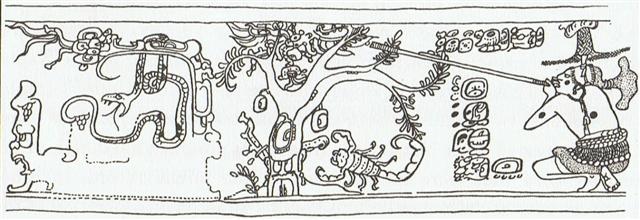
|
|
Aug 10 |
11 |
12 |
13
(225) |
14
(*146) |
15
(227 → π) |
|
°Aug
6 |
7 |
8
(220) |
9
(*141) |
10 |
11 |
|
'July
14 |
15 |
16 |
17
(*118) |
18 |
19
(200) |
|
SIRIUS |
"July 1 |
2 |
3
(*104) |
4 (185) |
Te Anakena 5 |
|
81 (=
158 - 77) |
82 |
83 |
84 |
85 =
185 - 100 |
86 =
227 - 141 |
|
...
Makoi replied, 'In Hiva the land belongs
to him - the land here is mine, not his
[tae oona]!'
They stayed (there longer).
On the fifth day
of the month of July (Anakena),
they all got up, went downhill, went on,
and reached Hanga Te Pau.
They took their provisions with them,
carrying them on their shoulders, went
on, and reached Te Pou. They made
camp and slept in Te Pou on the
tenth of the month of July (Anakena).
Then they all got up, carried their
provision on their shoulders, went
straight ahead, and followed the path of
the dream soul of Hau Maka. They
came to Hua Reva and said, This
is Hua Reva A Hau Maka!...
[E:21-22] |
|
CLOSE
TO THE FULL MOON: |
|
DEC 7 |
8 |
9 |
10 |
11 (345) |
12
(*266) |
|
Al Sa'd al Su'ud-22 (Luckiest of the
Lucky) /
Emptiness-11 (Rat)
TSIN =
36 Capricorni
(325.2),
ALPHIRK (The Flock) =
β
Cephei
(325.7),
SADALSUD
=
β
Aquarii,
ξ
Gruis (325.9) |
no star listed (326) |
CASTRA
= ε Capricorni
(327.2),
BUNDA
= ξ Aquarii
(327.5)
SIRIUS (α Canis Majoris) |
Mahar sha hi-na Shahū-26 (Western One in
the Tail of the Goat)
NASHIRA
=
γ
Capricorni
(328.0),
ν
Oct. (328.3), AZELFAFAGE
=
π¹
Cygni,
κ
Capricorni (328.7) |
Arkat sha hi-na Shahū-27 (Eastern One in
the Tail of the Goat)
ENIF (The Nose)
=
ε
Pegasi,
ERAKIS
=
μ
Cephei
(329.2),
46 CAPRICORNI,
JIH (the Sun)
=
κ
Pegasi
(329.3),
ι
Piscis Austrini (329.4),
λ
Capricorni (329.6),
ν
Cephei (329.7),
DENEB ALGIEDI
=
δ
Capricorni
(329.8)
*288.0 = *329.4 - *41.4 |
θ Piscis Austrini
(330.1), λ Octantis (330.7) |
|
Febr
9 (40) |
10 |
11 |
12
(408) |
13
(*329) |
All
Hearts' Day |
|
°Febr
5 (36) |
6 |
7 |
8
(*324) |
9 |
10 (41) |
|
'Jan
13 (378) |
14 |
15
(*300) |
16 |
17 |
18 (383) |
|
"Dec
30 |
31 (*285) |
"Jan
1 (366) |
2 |
3 |
4 |
|
*184
= *325 - *141 |
*185
= *285 - *100 |
*(83
+ 183 - 80) |
*187 |
*188 |
*189 |
|
SIRIUS & SUN |
|
ºJune 30 (*101) |
22 |
'June 30 (*101) |
13 |
"June 30 (*101) |
22 |
JUNE 30 (*101) |
|
 |
 |
 |
 |
|
Ga2-11
(41) |
Ga3-5 (64) |
Ga3-19 (78) |
Ga4-18
(101) |
|
July 4
(*105) |
July 27 (*128) |
Aug 10 (*142) |
Sept 2 (*165) |
|
ALZIRR |
59 = 2 * 29½ |
ALKES |
|
ST JOHN'S DAY |
JUNE 25 (181 - 5) |
26 (177 = 354 / 2) |
27 |
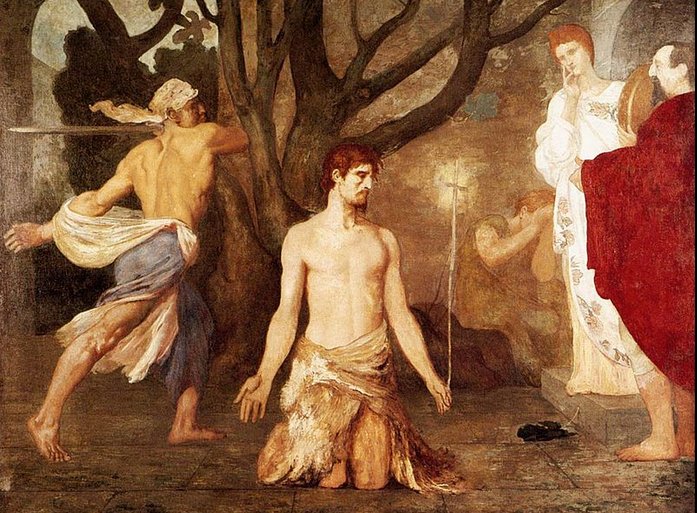 |
 |
 |
 |
 |
|
Ga4-12 (175 = 350 / 2) |
Ga4-13 → 14 * 29½ |
Ga4-14 → Bharani |
Ga4-15 → 4 * 15 = 60 |
|
p Carinae (159.3) |
φ Hydrae
(160.3) |
no star listed (161) |
VATHORZ POSTERIOR = θ
Carinae
(162.1),
PEREGRINI = μ Velorum,
η Carinae
(162.6) |
|
...
This [η
Carinae] is one of the
most noted objects in
the heavens, perhaps
even so in almost
prehistoric times, for
Babylonian inscriptions
seem to refer to a star
noticeable from
occasional faintness in
its light, that Jensen
thinks was η.
And he claims it as one
of the temple stars
associated with Ea, or
Ia, of Eridhu¹, the Lord
of Waters, otherwise
known as Oannes², the
mysterious human fish
and greatest god of the
kingdom.
¹
Eridhu, or Eri-duga, the
Holy City, Nunki, or
Nunpe, one of the oldest
cities in the world,
even in ancient
Babylonia, was that
kingdom's flourishing
port on the Persian
Gulf, but, by the
encroachment of the
delta, its site is now
one hundred miles
inland. In its vicinity
the Babylonians located
their sacred Tree of
Life.
²
Berōssōs described
Oannes as the teacher of
early man in all
knowledge; and in
mythology he was even
the creator of man and
the father of Tammuz and
Ishtar, themselves
associated with other
stars and sky figures.
Jensen thinks Oannes
connected with the stars
of Capricorn; Lockyer
finds his counterpart in
the god Chnemu of
Southern Egypt; and some
have regarded him as the
prototype of Noah
...
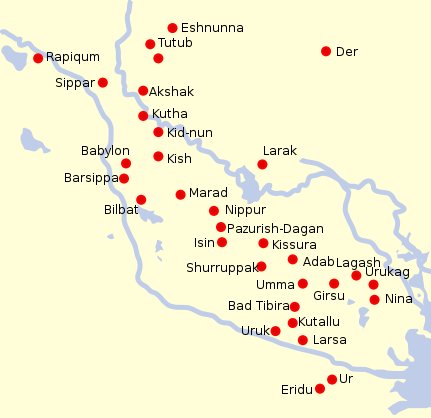 |
|
Aug 27 |
28 (240) |
29 (*161) |
30 |
|
°Aug 23 |
24 (236 = 8 * 29½) |
25
(*157) |
26 |
|
'July 31 |
'Aug 1 |
2 (214) |
3 (*500) |
|
"July 17 |
Te
Anakena 18 |
19 (200) |
20 (*121) |
|
... They
went on and came to
Tama. They looked around
and said, 'This is
Tama.' They gave the
name 'Tama, an evil fish
(he ika kino),
a very long nose (He
ihu roroa).' Again
they went on and came to
One Tea. They saw it,
looked around, and gave
the name 'One Tea A Hau
Maka'. Then they went on
and came to Hanga
Takaure. There they gave
the name 'Hanga Takaure
A Hau Maka'. They made
camp and rested at the
Bay of Flies for a week
(etahi pohitu).
On
the eighteenth day of
the month of July
('Anakena'), they went
on from Hanga Takaure.
[E:23] |
|
CLOSE TO THE FULL MOON: |
|
CHRISTMAS EVE |
DEC 25 |
26 (360) |
27 |
|
η Aquarii (342.1), σ
Gruis (342.4),
SITULA (Water-jar)
= κ
Aquarii
(342.7)
*301.0 = *342.4 - *41.4 |
ε Piscis Austrini
(343.5), ο Pegasi, β
Gruis (343.8) |
ρ Gruis (344.0),
MATAR (Rain) = η Pegasi
(344.2), η Gruis
(344.6), β Oct. (344.7) |
λ Pegasi (345.0), ξ
Pegasi (345.1), ε Gruis
(345.3), τ Aquarii
(345.7), ξ Oct. (345.8),
μ Pegasi (345.9) |
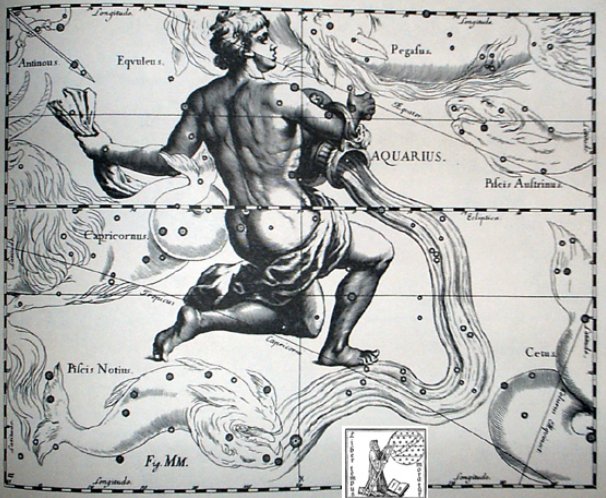 |
|
Febr 26 |
27 (58 = 2 * 29) |
28 (424) |
March 1 (*345) |
|
°Febr 22 |
23 |
24 (55) |
25 |
|
'Jan 30 (*315) |
31 |
'Febr 1 (32) |
2 |
|
"Jan 16 (*301) |
17 |
18
(383) |
19 |
|
Egyptian
courtyard |
 |
Phoenician
heth |
 |
Greek eta |
Η (η) |
|
... The
letter shape
ultimately
goes back to
a hieroglyph
for
'courtyard'
... possibly
named
hasir
in the
Middle
Bronze Age
alphabets,
while the
name goes
rather back
to
hayt,
the name
reconstructed
for a letter
derived from
a hieroglyph
for 'thread'

... The
kaikai
are the
rythmic
songs that
are sung to
cat's
cradles, the
string games
that are
found not
only
throughout
the Pacific
but
throughout
the world.
On
premissionary
Rapa Nui
the
kaikai,
together
with their
corresponding
cat's
cradles,
were not
simple
children's
games but
were used,
among other
things, to
produce
magic
effect. They
were highly
important
for the
study of
Rapa Nui's
rongorongo.
This is
because it
was
apparently
with the aid
of cat's
cradles that
the
rongorongo
experts
taught their
pupils to
learn many
of the
chants
accompanying
the incised
inscriptions
...
... string
games could
be resumed
after it was
clear that
the Sun had
managed to
leave the
horizon and
was rapidly
gaining in
altitude:
'Before the
sun starts
to leave the
horizon ...
when it
shows only
on the
horizon, ...
then string
games were
no longer
allowed as
they might
lacerate the
sun. Once
the sun had
started to
go higher
and could be
seen in its
entirety,
string games
could be
resumed, if
one so
wished. So
the
restriction
on playing
string games
was only
applicable
during the
period
between the
sun's return
and its
rising fully
above the
horizon
...
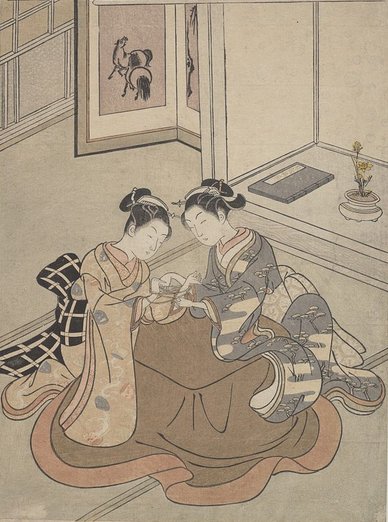 |
|
JUNE 28 |
29 (180) |
SIRIUS |
JULY 1
(*102) |
 |
 |
 |
 |
|
Ga4-16 |
Ga4-17
(100) |
Ga4-18 |
Ga4-19 |
|
ν Hydrae
(163.1) |
no star
listed
(164)
ALTAIR (α
Aquilae) |
Wings-27
(Snake)
η
Octans
(165.4),
ALKES
(Shallow
Basin)
=
α
Crateris
(165.6)
*124.0 =
*165.4 -
*41.4 |
ANA-TIPU-4
(Upper-side-pillar
- where
the
guards
stood)
MERAK
(Loin,
not
Lion) =
β
Ursae
Majoris
(166.2),
DUBHE
(Bear) =
α
Ursae
Majoris
(166.7) |

The
Chinese
Emperor
was
drawing
his bow
at
Sirius
but he
did not
use an
arrow ('teka').
His
expectant
servant
in front
of him -
probably
a female
we can
see from
her
'crocodile'
girdle -
seems to
be
waiting
for the
resulting
rain
drops.
It was
the
place in
the sky
named
after a
dry
shallow
basin (Al
Kes). |
|
Aug 31 |
Sept 1 |
2 (*165) |
3 (246) |
|
°Aug 27 |
28 |
29 (*161
→ °June
10) |
30 (242) |
|
'Aug 4
(216) |
5 (*137) |
6 |
7 |
|
"July 21 |
22 / 7 →
π |
Te
Anakena
23 |
24
(*125) |
|
... They
remained
in
Hanga
Hoonu
for five
days. On
the
twenty-third
day of
the
month of
July
('Anakena'),
they
reached
Rangi
Meamea
...
[E:25-26] |
|
CLOSE TO
THE FULL
MOON: |
|
DEC 28 |
29 |
30 (364) |
31
(*285) |
|
ι Cephei
(346.0),
λ
Aquarii,
γ Piscis
Austrini,
σ Pegasi
(346.5) |
SCHEAT
AQUARII
= δ
Aquarii
(347.0),
ρ
Pegasi
(347.2),
δ
Piscis
Austrini
(347.4),
FOMALHAUT
(Mouth
of the
Fish)
=
α
Piscis
Austrini,
τ
Gruis
(347.8)
*306.0 =
*347.4 -
*41.4 |
FUM AL
SAMAKAH
(Mouth
of the
Fish)
=
β
Piscium
(348.3),
ζ
Gruis
(348.5),
ο
Andromedae
(348.9) |
Al Fargh
al
Mukdim-24
(Fore
Spout) /
Purva
Bhādrapadā-26
(First
of the
Blessed
Feet) /
House-13
(Pig)
SCHEAT
PEGASI
=
β
Pegasi,
π
Piscis
Austrini
(349.3),
κ
Gruis
(349.4),
MARKAB
PEGASI
=
α
Pegasi
(349.5)
*308.0 =
*349.4 -
*41.4 |
|
The 2nd
(Rear)
Spout
came 16
days
later,
viz. at
Sirrah,
at 0h
(*365.5
- *349.5
= *16.0)
: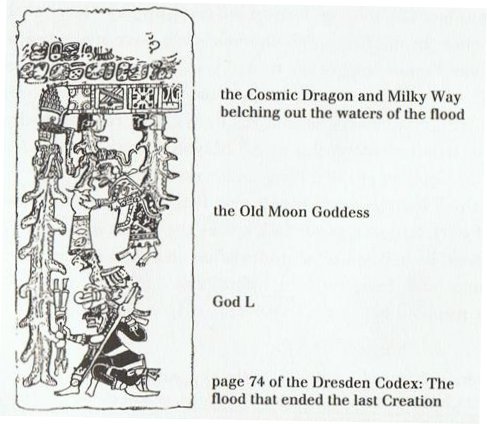
|

|

|
|
Aa6-66 (482)
1146 = 3 * 191 |
ua |
|
|
|































